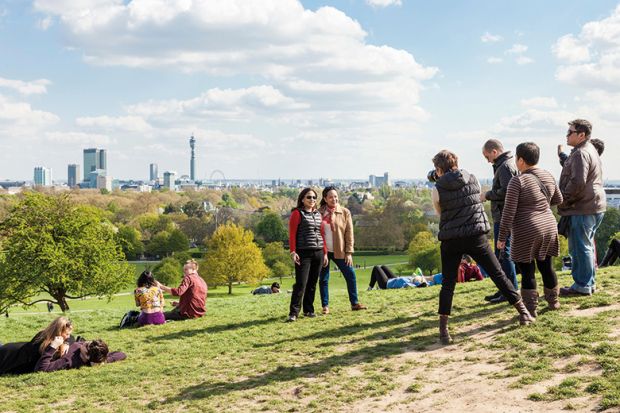Could London’s universities press the UK government to grant them a special, more open visa regime for international students?
As the Home Office develops plans to pursue a “differentiated” approach on student visas – tailoring the visa regime to an institution’s “quality” – some in the sector are now putting forward their own alternative models of differentiation.
The clear direction of Home Office policy is to take a more stratified approach to universities in terms of their ability to recruit overseas students, but the consequences of such an approach could be far-reaching in terms of financial impact on universities and the nature of their course offerings.
Analysis by Times Higher Education has shown that there were nine UK institutions drawing more than 25 per cent of their total income from non-European Union student tuition fees in 2014-15. Six are London institutions: the University of London (which relies on international programmes provided overseas rather than recruitment into the UK); the London School of Economics; City, University of London; the Royal College of Art; University of the Arts London; and Soas, University of London.
Another three are regional institutions with London campuses – the University of Sunderland, Coventry University and Heriot-Watt University.
These institutions may argue that their financial sustainability relies on continued access to overseas students.
Tim Blackman, vice-chancellor of Middlesex University, spoke at a recent event titled “Does London need its own visa?”, which featured a range of figures from business and was hosted at the London Assembly.
He noted that London backed Remain in the EU referendum, signalling that “residents in London have a different attitude to immigration compared to other parts of the country”.
Additionally, he told THE, London has a “unique position in the UK economy” and has a “need for skills over and above those – certainly at the moment – that can be produced domestically”.
Professor Blackman argued that one way to take into account such factors would be “to allow some differentiation in immigration policy by region” and to offer London universities a special regime on student visas.
The Home Office has already created a pilot scheme that eases the visa regime for master’s students at four universities – the universities of Bath, Cambridge and Oxford along with Imperial College London.
Professor Blackman said that he was going to raise the issue of differentiation at London Higher, the umbrella body for universities in the capital.
“I think it is worth the London institutions getting together and discussing this,” he said.
“I’ve heard it suggested that further to the Home Office pilot…groups of universities may volunteer to carry out the eligibility checks [on non-EU students] if they can assure the Home Office that as a group they have a robust system.”
Others may object that a special visa regime for London universities would further privilege the capital at the expense of the UK’s regions.
The Department for Education’s teaching excellence framework – which will rely on metrics around student satisfaction and graduate employment outcomes – is viewed as one method likely to be used by the Home Office in its differentiated approach to universities on visas.
The London School of Economics was placed at 81st in the benchmarked “mock TEF” produced by THE. A number of London institutions combine high reliance on overseas fee income with low placings in the mock TEF, so the prospect of the Home Office tailoring student visa regimes to TEF judgements may alarm them, if the mock exercise proves any guide to the genuine outcome.
Universities’ visa refusal rates could be another metric examined by the Home Office to judge whether an institution meets “quality” standards.
The possibility of using Russell Group membership as a criterion within the student visa regime is also understood to be under consideration by the Home Office, particularly in terms of potentially bringing back a post-study work visa for institutions in that group.
The Russell Group, mainly composed of institutions with medical schools, admitted four new members in 2012 but has never published the criteria by which it awards membership. Some believe that awarding Russell Group institutions a more favourable visa regime could be challenged under judicial review by the institutions excluded.
Do other countries take a differentiated approach to universities on visas?
Andrew Norton, higher education programme director at the Grattan Institute in Australia, said that there, “while there are no caps by education provider, some providers have better immigration risk ratings and so it is easier for their applicants to get their visa application approved.
“But this is to ensure that students are genuine, not to limit the number of genuine students.”
Hans de Wit, director of the Center for International Higher Education at Boston College, said that some nations have instead focused on immigration restrictions post-graduation and stipulated, for example, that “students in STEM fields [can] stay for one or two years after graduation to find a job”.
He argued that to “limit access to study to only the best and brightest students and to go to only high-ranked institutions” would be “not only unfair to less qualified international students” but also to less prestigious universities. “So, it makes more sense to focus on restrictions to immigration after graduation than before entering for study,” he added.
POSTSCRIPT:
Print headline: Capital exception? New ideas for UK ‘differentiation’ emerge
Register to continue
Why register?
- Registration is free and only takes a moment
- Once registered, you can read 3 articles a month
- Sign up for our newsletter
Subscribe
Or subscribe for unlimited access to:
- Unlimited access to news, views, insights & reviews
- Digital editions
- Digital access to THE’s university and college rankings analysis
Already registered or a current subscriber? Login








